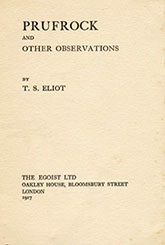The Love Song of J. Alfred Prufrock
Critique • Quotes
 Prufrock and Other Observations first edition, 1917
Prufrock and Other Observations first edition, 1917First publication
1915
Literature form
Poem
Writing language
English
Author's country
England
Length
132 lines, approx. 1,000 words
To be or not to eat a peach
Who the heck is J. Alfred Prufrock? The answer is: nobody important.
Which is itself important.
After you finish reading J. Alfred Prufrock's "love song", you may realize the name means very little. T.S. Eliot could have called his narrator Joe Schmo or Alfred E. Neuman for that matter. "Prufrock" is just something he made up to go in the title. It has an civilized, slightly fussy ring to it, which fits the modernist imagery of the poem, and you can make what you will of plays upon "proof" and "rock". But otherwise the character is meant to stand for anyone or everyone in these confusing times. Eliot makes no effort to develop a specific character for him. He's a vehicle through which the poet can muse on whatever the poet wants to muse on.
So is J. Alfred Prufrock really T. Stearns Eliot? Yes and no. It's like asking who Jude is in the Beatles song "Hey Jude", apart from being some dude with the movement he needs on his shoulder—it's just a name applied to whatever Paul McCartney wants to sing about. (Yeah, I know the song's supposed to be directed to Julian Lennon, but you're missing the point that this doesn't matter.) Prufrock is the name attached to the poem's point of view.
What a wussy point of view though. Going through life avoiding the big questions, shying away from taking any action, obsessing over trivialities, realizing one is fifth business in the drama of life, perpetually in a dream. More like the Beatles' "Nowhere Man" actually.
You can see in "The Love Song of J. Alfred Prufrock" early signs of Eliot's disgust with everyday material life and his yearning for eternal verities, which in later poems would turn into full-blown religiosity. His everyman (or no man) is hollow. Needs awakening. Which Eliot is to take as his poetic mission.
Strangers in strange imagery
What makes "The Love Song of J. Alfred Prufrock" a great poem though, in my opinion, is not the misbegotten commentary on woeful humanity but the style and technique. It's one lively poem. Nothing in it is like anything in poetry before. This may not be so apparent today because much poetry since then has been in imitation of this. You have to read earlier poetry to understand what an exciting, novel vision of poetry was being introduced by Eliot and the other imagists of this time.
"Prufrock" dispenses with sentimentality and romanticism, which had previously governed poetry. No grand, rolling phrases here except for satirical effect. No fine sentiments about finding all Truth in a single flower petal. No set verse form into which all vocabulary and grammar are contorted to fit. Line lengths and metres vary according to the rhythms of natural speech. Rhyme is thrown in sporadically for almost humorous effect. Poetic and colloquial language are mixed. High and low culture swirl together in a collage—references to Hamlet and Michelangelo alongside discussion of how one parts one's hair. Questions of mortality next to consideration of whether to eat a peach. Irony takes over as the aesthetic of the twentieth century.
And those arresting images. Images that seem surreal at first but quickly make sense in new ways. From those first arresting lines—had a sunset ever been compared to an unconscious surgery patient before?—to the evocative conclusion of life as a dream, frolicking among mermaids "Till human voices wake us, and we drown", the poem progresses by its startling imagery.
Compared to works by later poets that reached new heights of incomprehensibility, "Prufrock" is quite accessible, even pedestrian. It has an enchanting strangeness that quickly becomes familiar and will probably strike a chord in readers for years to come, riding through the waves of modernism, post-modernism and whatever comes next.
— Eric
Critique • Quotes

